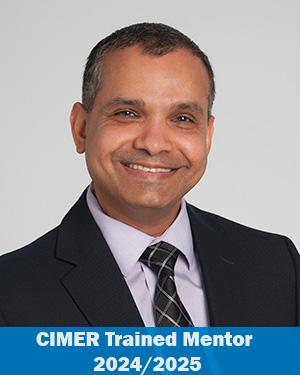Research News
08/29/2023
This researcher is never content to go with the “flow”
Renowned lung disease researcher Dr. Kewal Asosingh has established the Cleveland Clinic Flow Cytometry program as a world class institution, setting internationally recognized standards.

From the start of his scientific career, Kewal Asosingh, PhD, earned a reputation for using uncommon approaches to solve problems.
Under Dr. Asosingh’s leadership, Cleveland Clinic’s Flow Cytometry Core is internationally recognized for excellence in the field. He also discovered new contributors to lung disease treatment – something he credits to approaching research creatively. “Researchers don't have to follow the same path to achieve greatness,” says Dr. Asosingh, Scientific Director of Flow Cytometry. “Instead of meeting everyone at their best, I did my best."
“In science, it’s critical to find people who are willing to push forward their fields and take chances. Discovery happens when we challenge the status quo.”- Serpil Erzurum, MD, Chief Research and Academic Officer.

Thinking outside the box
When he first started at Cleveland Clinic in 2006, Dr. Asosingh took a chance on a big idea: What if the answers to lung disease could be found outside the lung?
The question came from research into what causes idiopathic pulmonary arterial hypertension (IPAH). In IPAH, pressure spontaneously starts rising in the lung’s main arteries, forcing the right heart to keep up. Without treatment, the condition causes lung damage and heart failure.
“It’s easy to focus in on the lungs and forget about what they’re connected to,” Dr. Asosingh recalls. “Everyone was looking for factors in the lung itself that could cause IPAH, but nobody was looking elsewhere.”
Dr. Asosingh used his expertise in flow cytometry to examine whether other cells in the body could contribute to this complex lung disease. He found that factors made the bone marrow, called hemopoietic cells, travel through the bloodstream and into the lungs where they “get stuck” in pulmonary blood vessels. These events, Dr. Asosingh discovered, elevate blood pressure in those vessels and cause IPAH. Since this initial discovery, he and his team have used preclinical models to demonstrate that bone marrow transplants from healthy donors stabilize blood pressure in IPAH-affected lungs.
Dr. Asosingh’s creative application earned him recognition by the International Society for the Advancement of Flow Cytometry (ISAC) in 2008. Within three years of his initial discovery, he was named one of five 2011 ISAC Marylou Ingram Scholars, a competitive program that encourages leadership in flow cytometry.
When Lerner Research Institute’s Flow Cytometry Core needed a new director in 2014, Dr. Asosingh’s experience was a natural fit.

Pioneering the role of flow cores
Under Dr. Asosingh’s leadership, Cleveland Clinic’s Flow Core set quality standards for shared flow cytometry resource centers across the world. However, the real key to success, he says, is educating the users.

We have world-class facilities stocked with some of the best machines in the world. But what’s more important is that we teach others how to use these tools in a creative way,” Dr. Asosingh says. "We were among the first Flow Cores to offer our clients services beyond merely inserting their sample tubes into machines. Understanding the flow cytometry experiment from beginning to end and guiding the user along each step is essential for successful research.”
In 2022, the ISAC recognized the LRI Flow Cytometry Core as a center of excellence. LRI’s Flow Cytometry Core is one of the first in the world to receive this accreditation.

Working at the cutting edge of asthma research
Dr. Asosingh’s lab is still looking for new regions in the lung that could answer some of the field’s most pressing questions. Inflammation that makes it hard to breathe with chronic conditions like allergies and asthma. Research typically looks at cells lining the airways that become inflamed. Current treatments, like inhalers, target this inflammation, but some people don’t effectively respond to that approach.

Continuing the research that he started in the Erzurum Lab when he started at Cleveland Clinic, Dr. Asosingh encouraged his team to look elsewhere in the lung. They found endothelial cells deeper in the lung contribute to the immune response that causes airway inflammation.

“Coming at the problem from a new angle led to a whole new category of cells we can try to target with new medications,” Dr. Asosingh says. “There are answers to these unsolved problems that face patients, we just have to push ourselves to think from a new perspective.
Featured Experts
News Category
Related News
Research areas
Want To Support Ground-Breaking Research at Cleveland Clinic?
Discover how you can help Cleveland Clinic save lives and continue to lead the transformation of healthcare.
Give to Cleveland Clinic